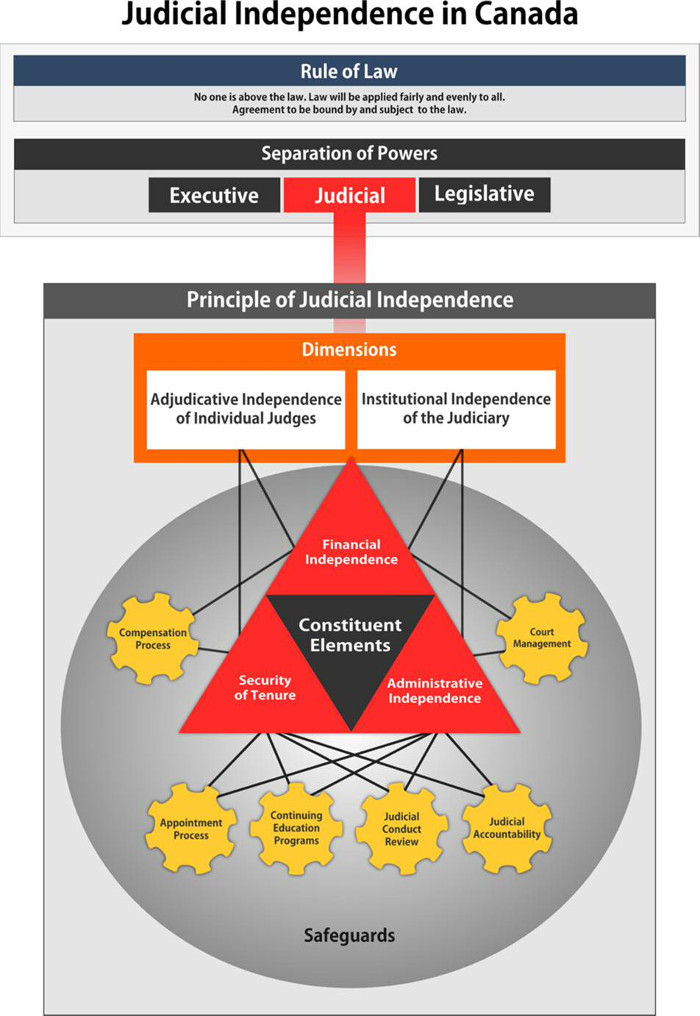“If Canada’s judges weren’t independent, our courts would be like hockey without a referee...“
There are three branches of government: judicial, executive, and legislative. The judicial branch interprets the law, resolves disputes, and defends the Constitution including the Canadian Charter of Rights and Freedoms. In order to do so, the judiciary is distinct from, and operates independently of, all other justice system participants, as well as the other two branches of government.

Judicial independence means that judicial officers of the Court, such as Judges, Justices and Judicial Justices of the Peace, have the freedom to decide each case on its own merits, without interference or influence of any kind from any source, including the other branches of government. While judicial decisions rarely result in everyone being happy, our Canadian justice system is based on a public confidence that decisions, whether they are popular or not, are made after a full and fair hearing. It is essential that the judiciary both be independent and appear to be independent, so that there is public confidence that judicial decisions are made without bias or outside influence.
It is the constitutional right of every Canadian to have his or her legal issues decided by fair and impartial judges. To guarantee the right to an independent and impartial judiciary, the law in Canada has certain constitutional protections or "essential conditions" that ensure judicial independence. These are security of tenure, financial security, and administrative independence.
Security of tenure prevents the arbitrary removal of judges. This means that if a judge makes a decision that the government does not like, or that goes against the government, the judge cannot simply be fired or removed from office as a result. Financial security provides an arm's length process, through a special independent remuneration commission, to determine the salaries and benefits paid to judges. Administrative independence enables the Court to manage itself, rather than be managed by others.
While these protections relate to judges, they are for the benefit of the public, not the judges. These protections enable courts to apply the rule of law that Canadians, through the electoral and legislative processes, have decided should govern them.
What does “judicial independence” mean?
Judges must be free, but obliged, to decide on their own.
Judges must be set apart from someone else’s influence or supervision.
Judges must be insulated against and independent from any and all sources of improper influence. This includes:
- All forms of coercion, threat or harassment, direct or indirect;
- Whether from government, politicians, persons in authority, relatives, neighbours, interested parties, fellow judges, chief justices, judicial bodies or organizations.
Why do we expect our judges to be independent in Canada?
- Judges are individuals tasked with deciding matters in dispute. In cases that go to court there is often a “winner” and a “loser” such that in most cases half of the people and sometimes all may not be “pleased” with the outcome.
- The Canadian system of law guarantees a “fair” trial, not a “favourable” outcome.
The fundamental concept of judicial independence exists for the benefit of all citizens, not judges.
Why does judicial independence protect the judges, the decision makers, from improper influence?
- To ensure that their decisions will be based upon the law as it applies to the evidence presented and properly admitted, in order to do justice between the parties.
This protection is enforced so that:
- Citizens will know they were dealt with fairly, that they received a fair trial, and a fair hearing; and
- Judges are insulated from any improper outside influence and who were bound only by their conscience and the law. Typically, the oath of office of Canadian judges includes “to do right according to law.”
In simple terms “judicial independence” is a matter of trust:
- Canadians need to know that legal disputes will be decided fairly, impartially, according to law, and in open court for the entire world to see.
Judicial independence is the shield that secures and protects those fundamental, constitutionally enshrined values:
- That is why judicial independence is a hallmark of Canada’s constitutional democracy; and
- That is why Canada’s citizens must remain vigilant and loudly protest against any attempt, from any quarter, to impede, frustrate or diminish judicial independence.
Judicial independence is important to you because it guarantees that judges are free to decide honestly and impartially, in accordance with the law and evidence, without concern or fear of interference, control, or improper influence from anyone.
For more information about Judicial Independence and what it means for you:
- Got questions about judicial independence? – Canadian Bar Association Q and A
- Judicial Independence – Government of Canada, Ministry of Justice website
- Judges in Canada – videos and teaching guide in English and French
 Print this page
Print this page